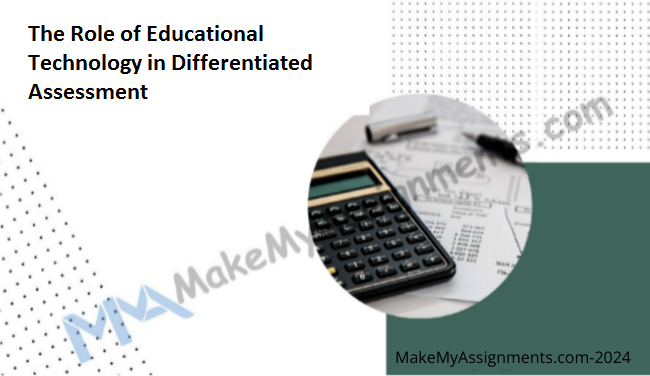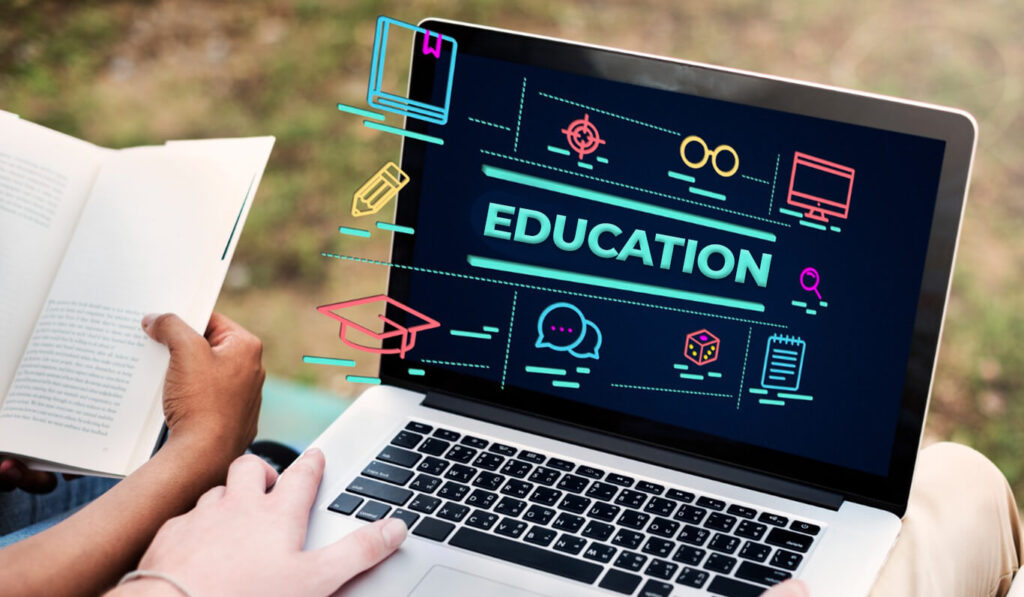
The Role of Educational Technology in Differentiated Assessment
In today’s rapidly evolving educational landscape, the integration of technology has transformed traditional teaching and assessment methodologies. One of the prominent advancements facilitated by educational technology is differentiated assessment—a pedagogical approach tailored to meet the diverse learning needs of students. By leveraging the capabilities of educational technology, educators can create personalized and adaptive assessment strategies that cater to individual strengths, interests, and learning styles. This blog explores the significant role of educational technology in differentiated assessment and its impact on enhancing student learning outcomes.

Understanding Differentiated Assessment
Differentiated assessment is rooted in the principle of recognizing and accommodating the unique abilities and needs of every learner within a classroom. Unlike traditional assessments that often employ uniform evaluation criteria, differentiated assessment emphasizes flexibility and customization. It involves adjusting the content, process, and product of assessments to suit the varied learning profiles of students. By adopting this approach, educators aim to promote equity, foster engagement, and maximize learning growth for all learners.
Advantages of Educational Technology in Differentiated Assessment
1. Personalization:
Educational technology provides a plethora of tools and resources that enable educators to personalize assessments according to individual student needs. Adaptive learning platforms, for instance, can dynamically adjust the difficulty level of questions based on students’ performance, ensuring an appropriate challenge for each learner. Furthermore, online assessment platforms offer features such as branching scenarios and interactive multimedia, allowing students to engage with content in ways that align with their preferences and abilities.
2. Data-Driven Insights:
Digital assessment tools generate comprehensive data analytics that offer valuable insights into students’ learning progress, strengths, and areas for improvement. By analyzing this data, educators can identify patterns, trends, and individual learning trajectories, enabling them to make informed instructional decisions. Moreover, adaptive assessment algorithms can provide real-time feedback to students, guiding them towards mastery and facilitating self-directed learning.
3. Accessibility and Inclusivity:
Educational technology promotes accessibility by providing diverse modalities for assessment delivery. For students with disabilities or special needs, digital assessments can offer accommodations such as text-to-speech functionality, adjustable font sizes, and alternative input methods. Additionally, technology-enabled assessments can be designed to accommodate linguistic and cultural diversity, ensuring equitable participation and representation for all students.
4. Engaging Assessment Formats:
Interactive multimedia elements, gamified assessments, and simulations are examples of innovative assessment formats made possible by educational technology. These engaging formats not only capture students’ interest but also assess higher-order thinking skills and real-world application of knowledge. By incorporating multimedia components and interactive simulations, educators can create authentic assessment experiences that reflect the complexities of modern challenges and foster deep learning.
Implementing Educational Technology in Differentiated Assessment
1. Needs Assessment:
Before integrating educational technology into differentiated assessment practices, educators should conduct a thorough needs assessment to identify the specific learning needs, preferences, and technological proficiency levels of their students. Understanding these factors is crucial for selecting appropriate tools and designing effective assessment strategies.
2. Professional Development:
Educators require ongoing training and professional development opportunities to effectively leverage educational technology for differentiated assessment. Training programs should focus on familiarizing teachers with various digital assessment tools, interpreting assessment data, and implementing best practices for personalized learning and inclusive assessment design.
3. Collaboration and Sharing:
Collaborative networks and online communities provide valuable platforms for educators to share resources, exchange ideas, and collaborate on innovative assessment strategies. By leveraging the collective expertise of educators worldwide, practitioners can access a wealth of knowledge and inspiration to enhance their differentiated assessment practices.
4. Continuous Improvement:
Educational technology is continuously evolving, offering new possibilities and functionalities for differentiated assessment. Educators should embrace a growth mindset and remain open to exploring emerging tools and methodologies that can further optimize assessment practices and promote equitable learning outcomes for all students.
MakeMyAssignments, as an online platform specializing in academic assistance, plays a pivotal role in supporting students in the realm of differentiated assessment enhanced by educational technology. Here’s how MakeMyAssignments can assist students:
1. Tailored Assignment Help:
MakeMyAssignments offers personalized assignment assistance tailored to individual student needs. Whether students require support with traditional assessments, technology-enabled tasks, or differentiated assignments, the platform connects them with expert tutors who possess the necessary expertise to provide customized guidance and support.
2. Access to Educational Technology Tools:
MakeMyAssignments provides access to a wide range of educational technology tools and resources that students can utilize to enhance their learning and assessment experiences. From interactive learning modules to adaptive assessment platforms, students can leverage these tools to engage with content in innovative ways and optimize their performance in differentiated assessments.
3. Assistance with Digital Assessment Formats:
Many educators incorporate digital assessment formats, such as online quizzes, multimedia presentations, and simulation-based assessments, into their differentiated assessment strategies. MakeMyAssignments offers assistance and guidance to students on how to navigate and excel in these digital assessment formats, ensuring that they are well-prepared to meet the requirements of modern educational practices.
4. Support for Inclusive Assessment Practices:
Inclusive assessment practices are a key component of differentiated assessment, aiming to accommodate the diverse needs of all learners. MakeMyAssignments emphasizes inclusive approaches to assignment completion, providing support for students with disabilities, language barriers, or other learning challenges. Through accessible design and tailored support services, the platform ensures that every student can participate fully and succeed in their assessments.
5. Professional Guidance and Feedback:
MakeMyAssignments connects students with experienced tutors who offer professional guidance, feedback, and mentorship throughout the assessment process. Whether students require assistance with understanding assessment criteria, interpreting feedback, or refining their work, the platform’s tutors provide personalized support to help students maximize their learning outcomes and achieve academic success.
6. Collaboration and Peer Learning:
MakeMyAssignments fosters a collaborative learning environment where students can engage in peer-to-peer interaction, share resources, and exchange ideas related to differentiated assessment and educational technology. Through online forums, discussion boards, and collaborative projects, students can learn from each other’s experiences, perspectives, and insights, enhancing their understanding and mastery of assessment concepts.
MakeMyAssignments serves as a comprehensive academic support platform that empowers students to excel in differentiated assessment practices enhanced by educational technology. By offering tailored assistance, access to educational resources, support for digital assessment formats, inclusive practices, professional guidance, and opportunities for collaboration, MakeMyAssignments enables students to navigate the complexities of modern assessments with confidence and proficiency.


